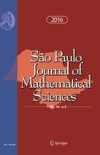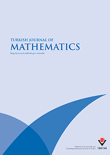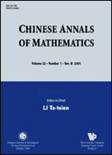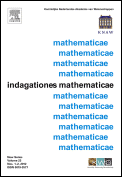
Sao Paulo Journal of Mathematical Sciences
Scope & Guideline
Unlocking new dimensions in mathematical research and discovery.
Introduction
Aims and Scopes
- Algebra and Ring Theory:
Research in this area includes studies on commutative and noncommutative rings, ideals, modules, and their properties, providing foundational insights into algebraic structures. - Geometry and Topology:
The journal publishes works on differential geometry, algebraic geometry, and topology, exploring the geometric properties of spaces and their applications in various mathematical contexts. - Dynamical Systems and Differential Equations:
A significant focus on the behavior of dynamical systems, including stability analysis, bifurcation theory, and limit cycles, particularly in the context of both ordinary and partial differential equations. - Mathematical Modeling and Applications:
Papers often address mathematical models applied to real-world problems, including epidemiology, economics, and environmental science, showcasing the relevance of mathematics in diverse fields. - Statistical Methods and Inference:
The inclusion of statistical methodologies and their applications, particularly in areas like reliability modeling and goodness-of-fit tests, highlights the journal's interdisciplinary approach. - Computational Mathematics:
The journal also emphasizes computational techniques, including numerical methods and algorithmic approaches, to solve complex mathematical problems.
Trending and Emerging
- Fractional Differential Equations:
An increasing number of papers focus on fractional differential equations, reflecting growing interest in non-integer order derivatives and their applications in various scientific fields. - Mathematical Biology and Epidemiology:
Research at the intersection of mathematics and biology, particularly in modeling infectious diseases and ecological systems, is on the rise, showcasing the relevance of mathematical techniques in public health. - Data Science and Machine Learning:
The integration of mathematical methods with data science and machine learning has gained traction, emphasizing the journal's commitment to contemporary applications of mathematics. - Algebraic Structures and Their Applications:
There is a growing focus on advanced algebraic structures, such as homological algebra and category theory, and their applications in various mathematical disciplines. - Complex Systems and Network Theory:
Emerging interest in complex systems and their dynamics is evident, with research exploring the mathematical underpinnings of networks and their behaviors.
Declining or Waning
- Classical Analysis:
There has been a noticeable decrease in the number of papers focused solely on classical analysis, such as real analysis and complex analysis, suggesting a shift towards more applied or computational methodologies. - Elementary Number Theory:
Research specifically dedicated to elementary number theory appears to be waning, potentially overshadowed by more complex algebraic structures and their applications. - Functional Analysis:
Papers in functional analysis have become less frequent, indicating a possible trend towards more specialized or applied areas of mathematics. - Graph Theory:
Although still a relevant field, the frequency of publications in graph theory has declined, perhaps as newer interdisciplinary areas gain prominence. - Historical Perspectives in Mathematics:
There seems to be a reduced emphasis on historical studies or retrospectives in mathematics, which may indicate a focus shift towards contemporary and forward-looking research.
Similar Journals

INDIAN JOURNAL OF PURE & APPLIED MATHEMATICS
Advancing Mathematical Frontiers Since 1996INDIAN JOURNAL OF PURE & APPLIED MATHEMATICS, published by the INDIAN NATIONAL SCIENCE ACADEMY, stands as a vital resource in the realm of pure and applied mathematics since its inception in 1996. With ISSN 0019-5588 and E-ISSN 0975-7465, this journal aims to disseminate original research that advances the understanding and application of mathematical principles. Operating out of New Delhi, India, it serves a diverse readership comprising researchers, scholars, and practitioners in the mathematical sciences. Recognized within the Q3 category in both Applied Mathematics and Miscellaneous Mathematics as per the 2023 category quartiles, the journal emphasizes rigorous peer-reviewed articles that contribute to its impact in academia, reflected in its Scopus rankings. Although it does not currently operate as an open-access journal, it maintains a commitment to quality and accessibility of scholarly content, striving to foster academic collaboration and innovation. The convergence of full-text issues from 1996 to 2024 highlights its ongoing dedication to the evolution of mathematical research.

Turkish Journal of Mathematics
Bridging Theory and Practice in MathematicsTurkish Journal of Mathematics is a prestigious academic publication dedicated to the advancement of mathematical research across a variety of subfields. Established in 1995 and published by the Tubitak Scientific & Technological Research Council Turkey, this journal has built a solid reputation, especially noted for its significant contributions to the field over the years, with its convergence spanning from 1995 to 2002 and again from 2006 to 2024. The journal, which holds a commendable Q2 ranking in Mathematics (miscellaneous) and is positioned in the 66th percentile of Scopus rankings for General Mathematics, aims to disseminate high-quality original research, reviews, and innovative methodologies to advance both theoretical and applied mathematics. Researchers, professionals, and students alike will find invaluable resources within its pages, providing insights that are pivotal for academic and practical applications in mathematics. Although it does not currently offer open access options, the journal remains an essential platform for those looking to engage with the forefront of mathematical inquiry.

Ukrainian Mathematical Journal
Connecting Researchers Through Quality ScholarshipThe Ukrainian Mathematical Journal is a prominent academic publication in the field of mathematics, focusing on a diverse range of topics that appeal to researchers, professionals, and students alike. Published by Springer, this journal has been an important platform for disseminating significant mathematical research since its inception in 1957. With the aim of fostering knowledge and collaboration within the mathematical community, the journal curates high-quality articles that meet rigorous scholarly standards, evidenced by its Q3 ranking in the miscellaneous mathematics category for 2023. Although it currently does not offer open access, the journal remains accessible through various institutional subscriptions. It serves as a vital resource for ongoing discourse in the field and invites contributions that further advance mathematical understanding.

Kyungpook Mathematical Journal
Exploring Innovative Applications in MathematicsWelcome to the Kyungpook Mathematical Journal, a prominent publication dedicated to the advancement of mathematical research across various fields, including applied mathematics and miscellaneous mathematical disciplines. Published by the Department of Mathematics at Kyungpook National University in South Korea, this journal aims to disseminate high-quality original articles, fostering a deeper understanding and innovative applications of mathematical theories. With a distinguished Scopus ranking in its category, standing at Q3 in Applied Mathematics and Q3 in Mathematics (miscellaneous), it serves as a crucial platform for both emerging and renowned scholars to share their findings with a global audience. This publication is indexed in reliable databases, ensuring enhanced visibility and impact for its contributors. Even though it currently lacks open-access distribution, the journal remains an essential resource for researchers, professionals, and students looking to stay at the forefront of mathematical exploration from 2007 to 2024 and beyond. Join us in contributing to the vibrant discourse that shapes the future of mathematics.

Korean Journal of Mathematics
Nurturing Excellence in Mathematical Inquiry.The Korean Journal of Mathematics, published by the Kangwon-Kyungki Mathematical Society, is an esteemed platform dedicated to advancing the field of mathematics. With an ISSN of 1976-8605 and E-ISSN of 2288-1433, the journal features a range of scholarly articles that emphasize both theoretical and applied aspects of mathematics, catering to researchers, professionals, and students alike. Although it is not open access, the journal maintains a commitment to academic rigor and integrity, ensuring high-quality contributions to the mathematical community. As it converges from years 2021 to 2024, the Korean Journal of Mathematics is poised to enhance its visibility within the Scopus database, currently ranking #354 out of 399 in the general mathematics category, reflecting its potential for growth and impact in the mathematical sciences. With its strategic focus and institutional backing from Kangwon National University, the journal serves as a vital resource for fostering research and dialogue in the ever-evolving landscape of mathematics.

CHINESE ANNALS OF MATHEMATICS SERIES B
Fostering Excellence in Applied Mathematics ResearchCHINESE ANNALS OF MATHEMATICS SERIES B, published by Shanghai Scientific Technology Literature Publishing House, is a prominent journal dedicated to fostering research and development in the field of mathematics. With an ISSN of 0252-9599 and an E-ISSN of 1860-6261, this journal provides a platform for the dissemination of innovative mathematical theories and methodologies. As of 2023, it is categorized within the Q4 quartile in *Applied Mathematics* and has achieved a commendable Q3 rank in *Mathematics (miscellaneous)*, emphasizing its growing influence in academia. Despite not being an open-access publication, it serves as a valuable resource for researchers, professionals, and students seeking to explore diverse mathematical topics, particularly from a unique regional perspective. The journal's extensive publication history—from 1980 and continuing to 2024—demonstrates a longstanding commitment to advancing mathematical knowledge and providing insights into various disciplines related to mathematics.

INDAGATIONES MATHEMATICAE-NEW SERIES
Pioneering research for the mathematical community.INDAGATIONES MATHEMATICAE-NEW SERIES is a distinguished academic journal specializing in the field of mathematics, with a focus on both theoretical and applied aspects of the discipline. Published by Elsevier, a leading publisher in the scientific community, this journal has established itself as a crucial platform for the dissemination of high-quality research. With an ISSN of 0019-3577 and an E-ISSN of 1872-6100, it operates out of the Netherlands and has been a vital resource for academics since its inception in 1969. Currently, it holds a Q2 ranking in the mathematics category, signifying its relevance and impact in the field, with a Scopus rank of #222 out of 399 in General Mathematics, placing it in the 44th percentile. Although it does not currently offer Open Access options, INDAGATIONES MATHEMATICAE-NEW SERIES is committed to contributing to the advancement of mathematics by publishing original research articles, reviews, and notes that enrich the academic community. Researchers, students, and professionals alike will find invaluable insights and developments within its pages, making it a cornerstone journal for those keen on exploring the complexities of mathematics.

Mediterranean Journal of Mathematics
Fostering Dialogue and Discovery in Mathematical SciencesThe Mediterranean Journal of Mathematics, published by SPRINGER BASEL AG, is a prominent platform dedicated to the advancement of mathematical research and education. Since its inception in 2004, this journal has been pivotal in disseminating high-quality research across various fields of mathematics, currently holding a notable Q2 ranking in the miscellaneous mathematics category as of 2023. With its ISSN 1660-5446 and E-ISSN 1660-5454, the journal enjoys a respected position in the academic community, evident by its Scopus rank of 129 out of 399 in General Mathematics, placing it in the 67th percentile. While primarily a subscription-based journal, it remains committed to providing a comprehensive resource for researchers, professionals, and students, fostering dialogue and exploration within the mathematical sciences. The Mediterranean Journal of Mathematics, based in Basel, Switzerland, continues to contribute significantly to the evolution of mathematical theory and practice, marking its relevance as we approach its 20th anniversary in 2024.

Research in the Mathematical Sciences
Fostering Excellence in Mathematical InquiryResearch in the Mathematical Sciences is a prestigious journal published by Springer International Publishing AG, specializing in a diverse range of mathematical disciplines. With an ISSN of 2522-0144 and an E-ISSN of 2197-9847, this journal operates out of Switzerland and has established a reputation for excellence in research dissemination since its inception in 2014. The journal is currently ranked in the highly regarded Q2 quartile for Applied Mathematics, Computational Mathematics, and Mathematics (miscellaneous), along with a Q3 rank in Theoretical Computer Science, reflecting its substantial influence within the academic community. Researchers will find great value in this journal as it features high-quality, peer-reviewed articles that contribute to the advancement of mathematical sciences. The journal promotes open access options, facilitating greater accessibility to innovative research findings. With its comprehensive scope and strong Scopus rankings, Research in the Mathematical Sciences serves as an essential resource for academics, professionals, and students eager to stay at the forefront of mathematical research and its applications.

Hacettepe Journal of Mathematics and Statistics
Pioneering Research in the Heart of Mathematics and StatisticsHacettepe Journal of Mathematics and Statistics, published by Hacettepe University in Turkey, is a vital platform for scholars in the fields of mathematics and statistics. With a commitment to promoting rigorous research, this journal covers a diverse range of topics including Algebra and Number Theory, Analysis, Geometry and Topology, and Statistics and Probability. Since its inception in 2008 and looking forward to its continued convergence up until 2024, it has established itself as a resource for both theoretical and applied mathematics. Although it currently holds a Q4 ranking in Algebra and Number Theory and Q3 in multiple other categories, its commitment to quality research is evident through its Scopus rankings, positioning it favorably among its peers. The journal operates on an open access model, facilitating wide dissemination of knowledge, and is particularly appealing to researchers, professionals, and students aiming to stay at the forefront of mathematical sciences. With an E-ISSN of 2651-477X, the Hacettepe Journal of Mathematics and Statistics aspires to foster collaboration and innovation in the mathematical community.